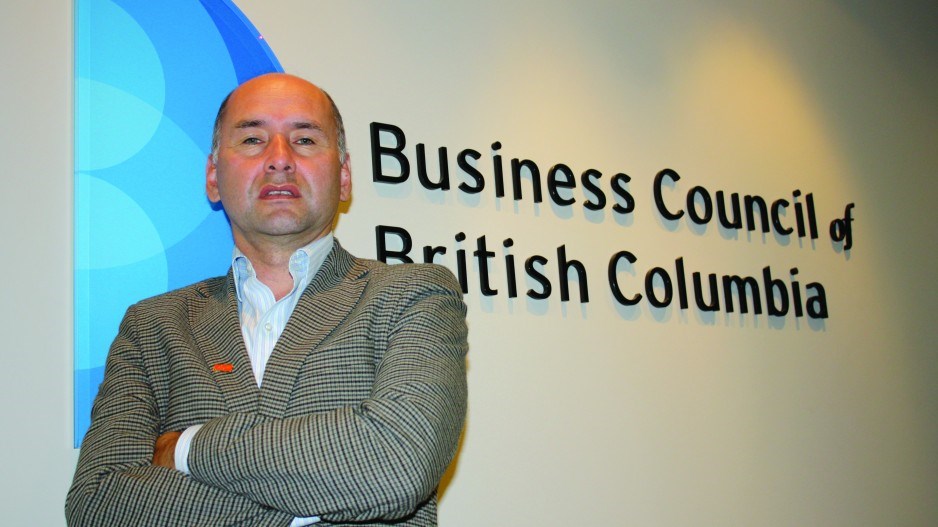Ellis Ross, former chief councillor for the Haisla Nation, is making the jump from band politics to provincial politics, as the Liberal candidate for Skeena. Ross officially stepped down as chief councillor on September 30.
A proponent of First Nations participation in a liquefied natural gas (LNG) industry, Ross recently spoke to Business in Vancouver about why he decided to run as a Liberal candidate and about his thoughts on First Nation support for a liquefied natural gas industry and opposition to oil pipelines.
Q&A
Q: The NDP, which has elected First Nations members to the legislature, is seen as the natural home for First Nation politicians. What drew you to the BC Liberal Party?
A: What I liked about the Liberal party is that everything we’ve achieved as a First Nation community in Kitimat was because of the Liberals’ approach to our issues. When it came to land, when it came to permitting, when it came to co-operation, the Liberals did everything they could to accommodate us.
I couldn’t really track one thing, in talking with our older people or more experienced councillors, in comparison – what has the NDP done for us? And we couldn’t figure it out. We came to compromises in a lot of situations, and I believe that is really the basics of reconciliation.
Q: If you lose, would you consider running again for a Haisla council seat?
A: No. I made my decision two years ago that I wasn’t going to be chief councillor anymore. I made it clear that I wasn’t going to come back to council in any form – no consulting, no staff position, no adviser, nothing. And that’s still the plan.
Q: You say your wife essentially made the decision for you. She didn’t want you seeking re-election to band council. Why is that?
A: It’s a tough job, and I think anybody on chief and council in any band will tell you the same: it’s really tough when your own people come after you. Opposition in villages in B.C. [is] not as formalized as B.C. or federal politics. Most of the time it’s not on the issues – it’s more on the personalities.
Q: You have been a strong supporter of an LNG industry. Are you concerned the Haisla might not be so supportive when you are no longer on council?
A: I don’t need to be here. There’s tremendous support for LNG still, with or without me.
Q: What will be your main platform planks?
A: Of course, LNG. But there are a lot of different areas here that need highlighting. The stable economy here in the northwest has always been forestry. I think that we could make it better for the forest industry and Terrace-Kitimat-Nisga’a if we actually sat down and talked about the problems we have here in the northwest. With or without LNG, forestry is still here.
Q: What needs to be done to improve the forest industry then?
A: We have some tenure – the Haisla Nation Council – but to make it viable we need more tenure.
Q: There is generally strong support for an LNG industry among First Nations in B.C., but it doesn’t always look that way in the media. Why is that?
A: The First Nations Limited Partnership group, for instance – one of the oldest groups in B.C. that was put together to participate in the pipeline activities – they’re still there. I don’t get how they got lost in the mix. This is the only group in northwestern B.C. that said, “Let’s leave our politics at the door, and let’s look at the economics of a pipeline.” That’s 16 First Nations from Prince George to Kitimat.
Q: Why is there support for LNG among First Nations, when there is such opposition – including by the Haisla – to oil pipelines?
A: I think for First Nation leaders, part of their job is to research the issues before they start to make comment on it or take a position. I think it’s what happened with LNG in B.C.
Q: Clearly they came to a very different conclusion about oil pipelines.
A: I think the bottom line for oil was you can’t pick this product up from a marine environment.
Q: Some people now think an LNG industry in B.C. might never take off now. You disagree. Why?
A: Because there’s been so much work and effort put into it – so much money – I really can’t see anybody walking away. For us, as Haisla, through the period of LNG groundwork, a lot of our people had really good paying jobs for a few years. It’s just a massive amount of work for the two projects. I can’t see them walking away.




